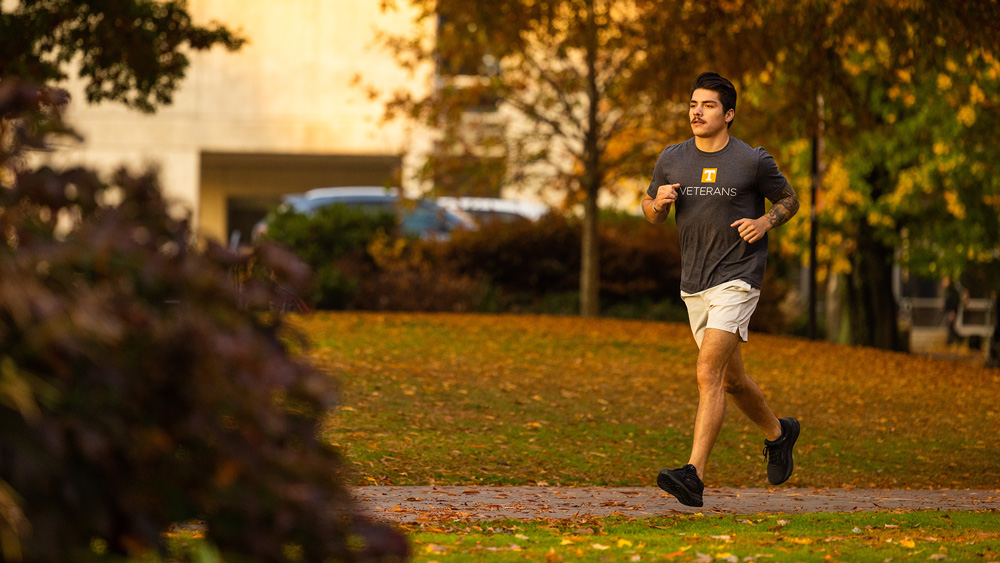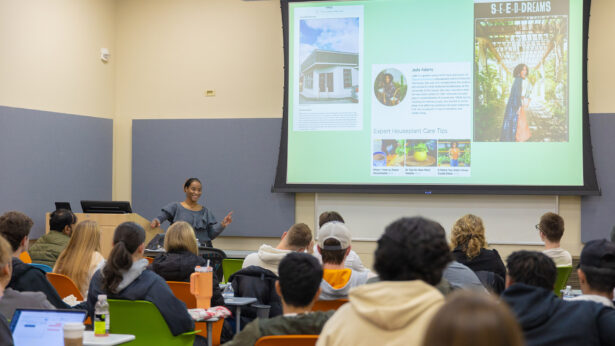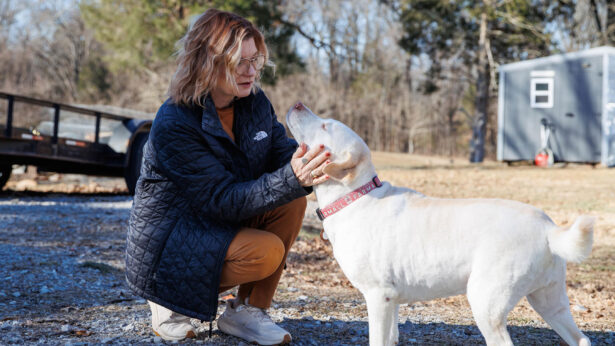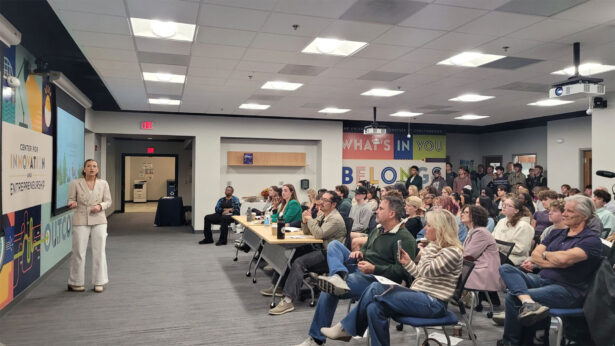There are 643 students at the University of Tennessee, Knoxville, who are unlike any others. They go to class and do their homework like typical students, but it’s their experiences and service in the military that set them apart. And UTK knows it takes a special type of support to help them succeed.
After serving in the U.S. Army for five years, Oregon native Trevor Vickery traveled around the country, searching for the right school to use his GI Bill benefits. Once he discovered the extensive network of support for veterans at UTK, he knew he had found his new home.
Senior Master Sergeant Rusty Dawson (Knoxville ’22, ’23), with the 134th Civil Engineer Squadron at McGhee Tyson Air National Guard base in Knoxville, used his GI Bill benefits to finish a long-delayed undergraduate degree and a Master of Business Administration, thanks to support from the Tennessee STRONG (Support, Training and Renewing Opportunity for National Guardsmen) Act, which provides eligible members of the Tennessee National Guard funding toward a first bachelor’s or master’s degree or a certificate or diploma from a vocational or technical school through a tuition reimbursement program.
In addition to financial assistance from federal and state funds, Vickery and Dawson have benefited from services and policies that have earned UTK a high ranking among public universities for veteran support. The university is ranked as military friendly—not only for veterans but also for spouses of veterans—based on initiatives like its Veterans Success Center and the fact that in-state tuition is available to veterans, active-duty military personnel, reservists, Tennessee National Guard members, and Army and Air Force ROTC cadets.
Over the past three years, as the national college retention rate has dropped by almost 2 percentage points, UTK’s rate has gone up. More than 91 percent of the 2022–23 first-year class returned this fall—the highest retention rate in the history of the university—thanks to an ecosystem of programs, like the Veterans Success Center, developed to ensure that students have the best chance at success.
“We believe every scholar deserves the opportunity to thrive, regardless of their background or experiences,” says Amber Williams, vice provost for student success. “That’s why we are committed to providing our veterans with the resources they need to succeed academically, professionally and personally.”
TRANSITION AND SUCCESS
After being accepted to UT Knoxville for the fall 2021 semester, Vickery, who also is a first-generation student, made his way across the country to Knoxville in a camper.
Transitioning from the very structured life of a soldier to the life of a college student was not easy. Before coming to Knoxville, Vickery served in the 75th Ranger Regiment and did two tours of duty in Afghanistan. UTK’s Veterans Success Center helped him move into the life of a college student by showing him that there were people who understood where he was coming from and that it was OK to ask for help.
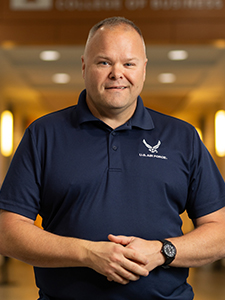
Vickery says staff at the center helped him with everything from the admissions process and registering for classes to finding his way around campus and signing up for study sessions. They even helped him through the process of buying a house.
“Even if someone didn’t know the answer, they would find someone who did,” Vickery says. “Without the center, I wouldn’t have made it because it was a struggle. I moved to Tennessee with no family, no friends, nothing.”
Dawson agrees, saying the Veterans Success Center helped him with paperwork so he could continue to graduate school after completing his undergraduate degree in construction science—two accomplishments he had worked toward for nearly 20 years.
Five years after joining the military in June 2001, Dawson enrolled at East Tennessee State University to earn a degree in land surveying. Over the course of a decade, he made two attempts at finishing his degree. He made the long drive to campus in Johnson City three times a week for classes that didn’t finish until 10 p.m. Then he would make the drive back to Seymour and get up for work the next morning.
“I took classes while deployed, many times staying up in the middle of the night to do exams and submit work because of the time difference,” Dawson says. “I tried as hard as I could, and I just couldn’t make the grades.”
At his wife’s urging, Dawson applied to UTK but thought getting in would be a long shot because of his low GPA. However, following a change in 2020 to the way UTK evaluates the transcripts of veterans, he was accepted and got to work earning his undergraduate degree.
“Every day that I walked into class and onto that campus, it was very humbling to me,” says Dawson. “Because I’ve been through so much, and then I actually started making really good grades.”
He felt the support of faculty members who he says let him start with a clean slate, despite his academic past, and have been accommodating to his military schedule and his family life.
“I don’t know how I got in,” Dawson says, “but I feel like, somewhere, someone gave me a chance. So I really felt like I owe whoever that was a debt of gratitude.”
GIVING BACK
Vickery’s gratitude for the help he received from the staff of the Veterans Success Center spurred him to volunteer his own time as a peer mentor for the Veteran Impact Program, which launched in August 2022 with 31 students. The first-of-its-kind program provides incoming student veterans with academic and professional programming, resources and support to help them successfully navigate the transition to student life.
“We want to give them the best opportunity to be retained and ultimately graduate with a college degree in hand,” says Tom Cruise, program director of the Veterans Success Center and an Air Force veteran who used his GI Bill benefit to earn bachelor’s and master’s degrees at UTK.
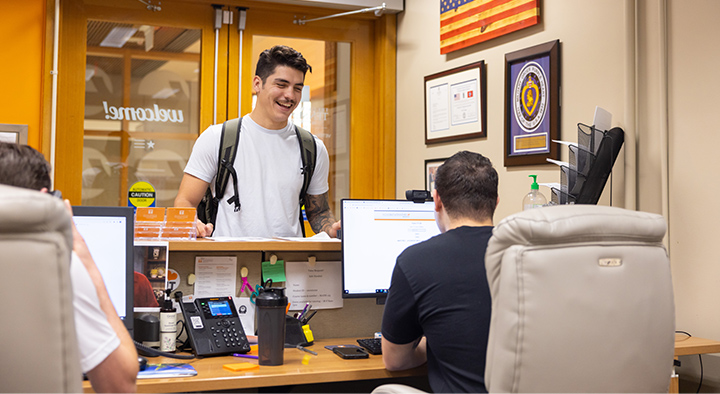
As a peer mentor, Vickery assists the academic coach in the classroom but also works to develop a more personal relationship with the program’s students to help guide them and keep them on track—academically, socially and mentally.
“A lot of these veterans are doing the same thing we did, as far as coming here alone with no family, no friends, no anything,” Vickery says. “And it’s hard to transition from that military community of some of your best friends and finding it all over again.”
Williams says UTK is committed to helping students like Vickery and Dawson by creating a campus environment where all veterans feel welcome, supported and valued.
“Our veterans have served our country with honor and distinction, and we owe them a debt of gratitude.”
